I had the distinct pleasure of hearing Dr. David Perlmutter present in person at the recent Integrative Healthcare Symposium. Dr. Perlmutter is a well-known neurologist and author of New York Times Bestsellers Grain Brain – The Surprising Truth About Wheat, Carbs, and Sugar – Your Brain’s Silent Killers and Brain Maker: The Power of Gut Microbes to Heal and Protect Your Brain – For Life
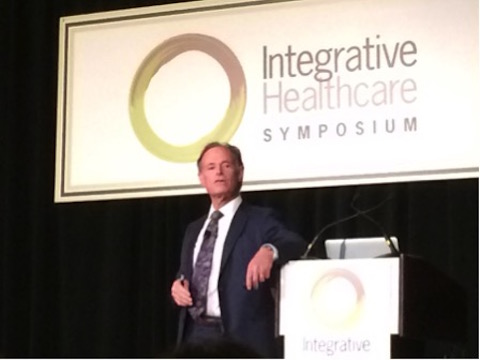
As expected, his talk was riveting, and so I’d like to share some of it with you! He opened with this quote from Julian Davies, Professor Emeritus, Microbiology and Immunology, UBC, showing just how much we have yet to learn about the microbiome:
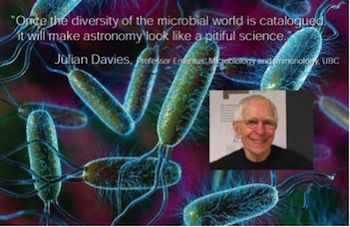
Once the diversity of the microbial world is catalogued it will make astronomy look like a pitiful science.
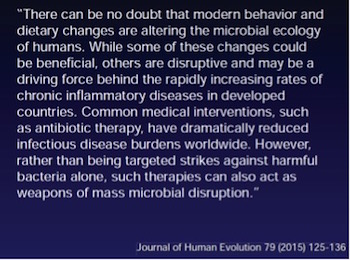
There can be no doubt that modern behavior and dietary changes are altering the microbial ecology of humans. While some of these changes could be beneficial, others are disruptive and may be a driving force behind the rapidly increasing rates of chronic inflammatory diseases in developed countries. Common medical interventions, such as antibiotic therapy, have dramatically reduced infectious disease burdens worldwide. However, rather than being targeted strikes against harmful bacteria alone, such therapies can also act as weapons of mass microbial disruption.
You can find the full paper here: Ancient Human Microbiomes
We know how harmful artificial sweeteners are (Mira Dessy writes about these and other harmful ingredients in her book The Pantry Principle)but now we are seeing how they affect the microbiome and contribute to diabetes.
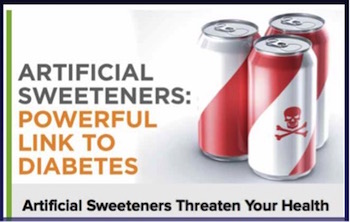
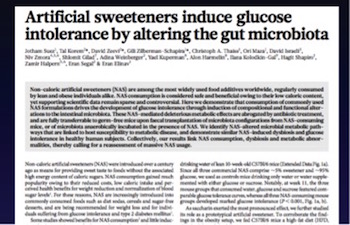
In summary, our results suggest that NAS [non-caloric artificial sweeteners] consumption in both mice and humans enhances the risk of glucose intolerance and that these adverse metabolic effects are mediated by modulation of the composition and function of the microbiota. Notably, several of the bacterial taxa that changed following NAS consumption were previously associated with type 2 diabetes in humans, including over-representation of Bacteroides and under-representation of Clostridiales.
You can read the entire article in Nature: Artificial sweeteners induce glucose intolerance by altering the gut microbiota
You may have switched to artificial sweeteners because of sugar cravings and the desire to reduce sugar consumption. If this is the case, and you want to quit the artificial sweeteners and not go back to sugar, do check out this recent blog I wrote about diabetes and anxiety/cravings, and how the amino acid GABA was shown to:
increase islet hormonal secretion, suggesting potential therapeutic benefits for diabetes.
The GABA, will of course, also help with the cravings and quitting and not leave you feeling deprived, or needing to use willpower. You can read more on this topic here: GABA for ending sugar cravings (and anxiety and insomnia)
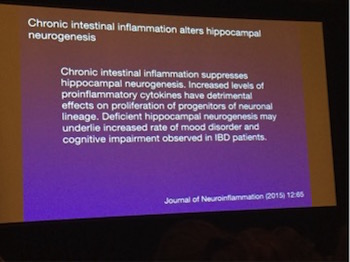
This paper in the Journal of Neuroinflammation shows us how connected the gut and the brain are:
Chronic intestinal inflammation suppresses hippocampal neurogenesis. Increased levels of proinflammatory cytokines have detrimental effects on proliferation of progenitors of neuronal lineage. Deficient hippocampal neurogenesis may underlie increased rate of mood disorder and cognitive impairment observed in IBD [inflammatory bowel disease] patients.
You can read the paper here: Chronic intestinal inflammation alters hippocampal neurogenesis.
This paper: Glyphosate, pathways to modern diseases II: Celiac sprue and gluten intolerance states that :
Celiac disease, and, more generally, gluten intolerance, is a growing problem worldwide, but especially in North America and Europe, where an estimated 5% of the population now suffers from it. Symptoms include nausea, diarrhea, skin rashes, macrocytic anemia and depression. It is a multifactorial disease associated with numerous nutritional deficiencies as well as reproductive issues and increased risk to thyroid disease, kidney failure and cancer. Here, we propose that glyphosate, the active ingredient in the herbicide, Roundup®, is the most important causal factor in this epidemic.
Glyphosate residues in wheat and other crops are likely increasing recently due to the growing practice of crop desiccation just prior to the harvest.
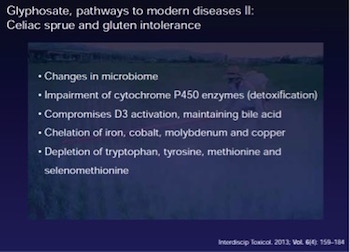
It discusses how glyphosate can cause the following:
- Changes in microbiome
- Impairment of cytochrome P450 enzymes (detoxification)
- Compromises in D3 activation, maintaining bile acid
- Chelation of iron, cobalt, molybdenum and copper
- Depletion of tryptophan, tyrosine, methionine and selenomethionine
All of these factors can have a direct impact on your anxiety and depression levels. Dr. Perlmutter also discussed how glyphosate affects the shikimate pathway and in turn impacts our microbiome causing mood issues and anxiety.
Jeffrey Smith, non-GMO advocate, founder of Institute for Responsible Technology also talks about this on our Anxiety Summit interview: Anxiety, depression, GMOs and Roundup
Roundup shuts down this pathway called the shikimate pathway. Monsanto bragged up-and-down because Roundup blocks the shikimate pathway in order to kill weeds. And because humans don’t have the shikimate pathway, they said Roundup must be safe for humans. But it’s not safe for a lot of reasons.
It’s an endocrine disruptor. It can promote cancer. It’s linked to heart disease and diabetes. But what they failed to point out was that the shikimate pathway is what our gut bacteria use to produce the vast majority of the l-tryptophan that we assimilate. L-tryptophan is a precursor to melatonin, which is linked to sleep and circadian rhythms, daily cycles, but it’s also a precursor to serotonin and now we land squarely on the world of anxiety. Without sufficient serotonin there can be anxiety and depression.
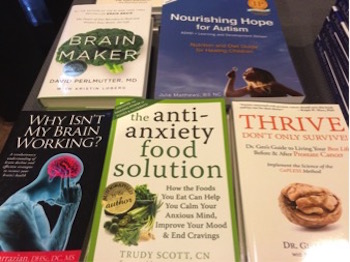
And now for a little fun! My book The Antianxiety Food Solution was on sale at the event, as was my colleague Julie Matthews’ book Nourishing Hope for Autism. After purchasing my signed copy of Brain Maker and “staged” it at the book table next to our books!
I have to admit it did give me a little thrill to see our books next to Dr. Perlmutter’s brilliant book and another great brain book Why Isn’t My Brain Working by Datis Kharrazian. The other book in the picture is a brand new book on prostate health by Dr. Geo Espinoza: Thrive Don’t Only Survive.

The other thrill was actually meeting a hero of mine! I heard his excellent presentation on the first day of the conference and then bumped in to him and his wife in one of the exhibit halls. I thanked him for his brilliance and asked if I could get a photo with him and he kindly obliged.
A bigger thrill and honor would be able to interview him on my next Anxiety Summit, now planned for June, so I can share his brilliance with you!
In the meantime, I encourage you to check out his great blog and get a copy of Brain Maker, so you can learn from this great man and feel your absolute best!
Got questions? Feedback? Please post them in the comments.
Leave a Reply